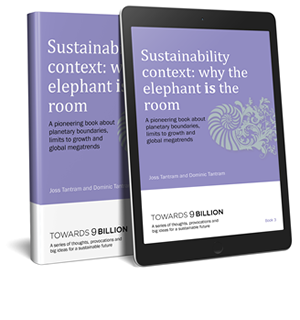Absolute beginnings – Are you paying attention?
“For me context is the key – from that comes the understanding of everything.”
Kenneth Noland
Sustainability is innately all about context. Pretty much anything can be sustainable if the circumstances are right or the scope of assessment is too narrow. Sustainability as it is  mostly commonly understood nowadays could be cynically defined as “an activity that someone or something hasn’t stopped you doing yet”.
mostly commonly understood nowadays could be cynically defined as “an activity that someone or something hasn’t stopped you doing yet”.
Sustainability is a vastly abused and misused term. In politics and economics it tends to mean that something financially ‘washes its own face’ over the short to medium term, rather than something is capable of persisting in perpetuity.
Sustainability is contingent. If it was located in outer space, you might consider a leaky nuclear reactor to be sustainable. Located up the road from your house though? Maybe not.
The judgement of what is sustainable is fundamentally contextual, and the only true context we should be interested in is that of the planet.
Almost all of the ‘sustainability’, CSR and environmental management efforts of the past few decades have been relative in both nature and intent. They are based upon the idea that reducing impacts relative to previous ones produces either sustainability itself or delivers progress on a pathway to sustainability (sustainable development).
Of course, without context, such assertions are impossible to prove. Who could possibly say that a company reducing its fossil fuel use by 10, 20 or even 30% is sustainable without first figuring out what a sustainable use of fossil fuels would be, in the context of the planet as a whole?
This is where concepts such a planetary boundaries, critical thresholds and context-based sustainability analyses come in. These either focus upon thresholds in environmental quality beyond which we might risk significant ecological instability, or upon types of behaviour that can be classed as sustainable because they do not disrupt the functions of natural (or possibly also social) systems.
Such approaches are intended to go beyond relative judgements, to place behaviour in an absolute context.
Whose context is it anyway?
“Sometimes your greatest strength can emerge as a weakness if the context changes.”
Harsha Bhogle
Contextual analysis is not a new thing. Hordes of strategic managers swarm out of MBA programmes every year, trained in the orthodoxy of strategic analysis and ready to join teams of similarly driven people in the companies of the world. Strategic analysis is the lookout in the crow’s nest of the ships of capitalism. Yet sadly, most of them still spy the horizon with blinkers on.
A plethora of whizzy analysis tools purport to allow the identification of strategic issues, risks and threats. However, all too frequently in practice their scope and vision is narrowed by a lack of understanding or recognition that the context they need to encompass is far larger and more complex than they are willing to admit. Systemic, contextual or existential risks can only be identified through an understanding of the proper scope of context. This context is the planet and the planetary systems upon which our life and health depends.
Responses to this perspective problem are in development, approaches to quantifying physical planetary limitations upon activity are emerging and being slowly explored by companies and policy makers. These include the nine planetary boundaries, doughnut economics and context-based sustainability.
From a reporting perspective, context based sustainability has received a boost with its inclusion in the UNEP (United Nations Environment Programme) report “Raising the Bar – Advancing Environmental Disclosure in Sustainability Reporting” (November 2015) which emphasises a fundamental requirement for companies to undertake strategic contextual analysis and also to contextualise their performance.
Approaches to the categorisation and quantification of the natural resources that support the functioning of natural systems are also being established, alongside tools that support individual companies and countries to place themselves and their impacts in the proper context. These include multiple capitals, ecosystem services, and natural capital accounting.
Knowledge and numbers
“Every man is a damn fool for at least five minutes every day; wisdom consists in not exceeding the limit.”
Elbert Hubbard
Sustainability of systems, societies and people on our finite planet is absolutely impossible without a recognition of the need for contextual understanding and contextual responses.
However the challenge for true sustainability context to become a defining strategic factor remains a significant one for two key reasons.
Firstly, because assessing legitimate “share” is difficult in a complex and interdependent world and, secondly; because in some respects context only requires us to pay attention to what we already know, that we urgently need to focus upon developing the capability for sustainable production and valuation processes.
Context tells us just how urgent that need is becoming.
Out now – Towards 9 Billion book series
We have packaged a range of our writing over the last few years into a series of short, E-books, which are available now on Amazon.
There are 5 in the series. The excerpts are free to download and can be accessed at www.terrafiniti.com/towards-9-billion-books
Here are just some of the kind things people have said about our work:
“Big ideas for massive challenges: Terrafiniti’s Towards 9 Billion provides a wide range of solution-oriented perspectives on the prospect – often seen as daunting – of accommodating 9 billion people within the remits of our one planet.”
David Nussbaum, Chief Executive, WWF-UK
“The Doughnut of social and planetary boundaries highlights the scale of the challenge humanity faces. Terrafiniti’s Towards 9 Billion is a fount of refreshing ideas for surmounting that challenge, imagining economics, finance and enterprise for a flourishing future.”
Kate Raworth, Creator of Doughnut Economics and Senior Visiting Research Associate, Environmental Change Institute, Oxford University
“Towards 9 Billion addresses the critical issues that face our planet in the 21st century, from business and economics to sustainable energy and technology. I love its wide-ranging intelligence, lucid prose and interdisciplinary approach to scoping a new economics for our age.”
Jane Gleeson-White, author of Six Capitals: The revolution capitalism has to have – or can accountants save the planet.
Sowing the seeds of a sustainable world?
Just as plants and animals broadcast seed and progeny in vast numbers in the hope that some will survive and flourish, we hope that our ideas might have the chance to do the same; to find receptive places in which to thrive.
We hope that our writing and the books might play a small but useful role in imagining and building a future fit for people and the planet.


Leave a Reply